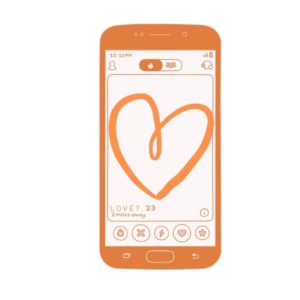Two people, both alike in swiping right,
In the time of Corona, where we lay our scene…
 One would imagine dating during the time of a global pandemic would decrease significantly. Instead, dating apps like Tinder, Hinge, and OkCupid are reporting substantial increases in usage. (Fast Company) What’s more, people seem to be more open to conversations and creating emotional connections than before. Researchers say that when meeting up immediately is no longer safe, people are taking their time getting to know one another, and working towards meaningful relationships as opposed to flings. (The Atlantic)
One would imagine dating during the time of a global pandemic would decrease significantly. Instead, dating apps like Tinder, Hinge, and OkCupid are reporting substantial increases in usage. (Fast Company) What’s more, people seem to be more open to conversations and creating emotional connections than before. Researchers say that when meeting up immediately is no longer safe, people are taking their time getting to know one another, and working towards meaningful relationships as opposed to flings. (The Atlantic)
We’ve published blogs talking about the dangers women are facing having to shelter in place in houses where they experience domestic violence, and the increase in violence against women in the pandemic. You can read more about what the UN labeled “The Shadow Pandemic” here.
What about the concerns of newly budding relationships?
One love is an organization devoted to educating young people on love and relationships. They recently released 10 signs of an unhealthy relationship and explain what these signs can look like during a global pandemic. They stress that “While everyone does unhealthy things sometimes, we can all learn to love better by recognizing unhealthy signs and shifting to healthy behaviors. If you are seeing unhealthy signs in your relationship, it’s important to not ignore them and understand they can escalate to abuse. If you think you are in a dangerous situation, trust your gut and get help.” (one love)
The ten signs are listed below and the full infographic can be found here.
- Intensity: When someone expresses very extreme feelings and over-the top behavior that feels overwhelming.
Expecting you to respond quickly to text/calls, expecting to spend all day together because you are home, relationships escalating faster than normal, self isolating together after a short time.
- Manipulation: When someone tries to control your decisions, actions or emotions.
Using shelter in place to control where you are, pressuring you to meet in person despite social distancing guidelines.
- Sabotage: When someone purposely ruins your reputation, achievements, or success.
Withholding WiFi, transportation, or money, not respecting communicated boundaries like work from home time, carelessly exposing you COVID19.
- Guilting: When someone makes you feel responsible for their actions or makes you feel like it’s your job to keep them happy.
Making you feel bad for having conversations about boundaries, expecting you to be okay sending or receiving explicit photos/messages due to lack of physical contact.
- Deflecting Responsibility: When someone repeatedly makes excuses for their unhealthy behavior.
Using the pandemic as an excuse for their unhealthy actions and behaviors like yelling or anything else on this list.
- Possessiveness: When someone is jealous to a point where they try to control who you spend time with and what you do.
Demanding you share your location at all times, looking through your phone, demanding to know who you’re talking to throughout the day.
- Isolation: When someone keeps you away from friends, family, or other people.
Pressuring you to quarantine with them instead of family/friends, expecting you to stay on the phone with them all day or for long stretches of time and limiting your interaction with others.
- Belittling: When someone does and says things to make you feel bad about yourself.
Putting you down for your work habits, snacking, physical appearance, or level of concern for COVID19.
- Volatility: When someone has a really strong, unpredictable reaction that makes you feel scared, confused or intimidated.
Lashing out and having extreme reactions to things out of their control like the WiFi not working, not being about to go out, etc.
- Betrayal: When someone is disloyal or acts in an intentionally dishonest way.
Exposing you or others to COVID19 knowingly or due to a lack of precautions, lying about breaking safety “bubbles” and symptoms of COVID19.
It is important to keep these red flags in mind when starting a new relationship, and even when evaluating existing ones. Abuse does not have to be physical to be real, and it is never excusable. If you are experiencing domestic violence contact the domestic violence hotline at 816-995-1000.
As always you can contact the Women’s Center at 816.235.1638 or umkc-womens-center@umkc.edu and we would be more than happy to assist you and/or direct you towards further help in whatever situation you are in.
Sources
https://www.fastcompany.com/90492617/how-covid-19-killed-hookup-culture-and-saved-romance
https://www.theatlantic.com/ideas/archive/2020/12/what-pandemic-has-done-dating/617502/